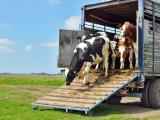Feb 1, 2006 (CIDRAP News) – A national conference scheduled Feb 14 and 15 in Minneapolis will give business leaders an opportunity to learn from experts about the risk of pandemic influenza and help figure out how their industries can prepare for it.
The meeting, called "Business Planning for Pandemic Influenza: A National Summit," is being organized by the University of Minnesota Center for Infectious Disease Research and Policy (CIDRAP), publisher of this Web site. The United States and Minnesota Chambers of Commerce are cosponsoring the event, to be held at the Minneapolis Convention Center.
The long list of speakers for the conference includes Health and Human Services (HHS) Secretary Michael Leavitt; former HHS Secretary Tommy Thompson; CIDRAP Director Michael T. Osterholm, PhD, MPH; and writer and scholar John Barry, author of The Great Influenza, a lengthy account of the 1918 flu pandemic. Ted Koppel, former host of the ABC News show "Nightline," will speak at a Feb 14 evening banquet.
The premise of the conference is that pandemic flu is a major global threat and that traditional business security and disaster-response plans will not be adequate for dealing with it, according to CIDRAP officials.
"We can no longer assume that business continuity plans for both our multinational companies and small businesses, largely based on a concept of a regional event of a limited duration, will approximate the actual impact and consequence of an influenza pandemic," Osterholm said in congressional testimony in December. "Rather, I believe an influenza pandemic will be like a 12- to 18-month global blizzard that will ultimately change the world as we know it today."
The conference will include expert speakers and panel discussions on topics affecting all industries, such as legal issues, healthcare, infrastructure, human resources, government support, and risk communication. After the general presentations, participants will gather with others from their own industry to discuss continuity planning. Sessions are planned for 11 different sectors, such as healthcare, manufacturing, agriculture and food, energy, transportation and warehousing, and construction and real estate.
Planners describe the summit as the first of its type on a national scale. "I think it's the first conference of its kind to bring together all the various industry sectors to actually work towards determining and addressing current gaps in planning" for the business community, said Osterholm. He added that some "solutions have been identified in one or more business sectors but not generally made available to other sectors."
David Olson, president of the Minnesota Chamber of Commerce, said the conference will give businesses a chance to prepare for disasters in general. "We obviously hope that a pandemic flu situation never arises, but we think this is a great opportunity for businesses to plan for any kind of disaster, whether it be flood, fire, or tornado," he told CIDRAP News. "If they're going to be prepared for flu, my guess is everything else is going to be less [difficult] than that."
Olson said he expects the meeting will attract mostly larger companies, giving them a chance to compare notes on their preparedness measures. "We're hoping to share some of that information with small and medium-sized companies at a later date," he said.
Besides those mentioned above, some of the other speakers and panelists are Ann Beauchesne, executive director of homeland security for the US Chamber of Commerce; former Minnesota Gov. Arne Carlson; Sherry Cooper, global economic strategist with Harris Bank and BMO Financial Group in Toronto; Richard Knox, science correspondent with National Public Radio; Jeffrey Levi, senior policy adviser at Trust for America's Health; and Stewart Simonson, assistant director for public health emergency preparedness in the US Department of Health and Human Services.
Beauchesne commented in a University of Minnesota news release, "Pandemic influenza needs to be on the minds of all organizations. It is not an 'if' but 'when' scenario. This is a critical event that should be a priority for all our members."
Osterholm said he hopes the meeting will be the beginning of an ongoing effort to help the private sector prepare for pandemic flu. "No one knows if the current situation [with avian flu] will lead to a pandemic, but regardless if it does, there will be another pandemic," he said "Any preparedness efforts we can make in this global just-in-time economy will be an investment well spent."




















